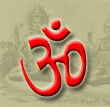om brhmahye namah......
SRaaDH`DH
THE ETERNAL AND EVERGREEN
EXPRESSION OF
CONTINUITY & GRATEFULNESS
IN CREATION
SRaaDH`DH Offering
To A Woman
dharma-raajaa alias yam-dev (god
of death who also metes out the fruits of one's kARm) explains in naarad
puran slok 1.14.75-76, 80, 81 about SRaaDH`DH
offering to a woman:
"An unmarried virgin is not treated as a separate in regard to
piND (rice ball or lump of rice offered in
SRaaDH`DH),
gotra (family lineage) and suutak
(impurity due to the birth of a child). A woman moves away from her original (birth)
gotra when the mantras
of marriage rites are recited (during vivaaH
(marriage) ceremony). A woman is separated from the gotra of her (birth) family
after the seventh step (in the spt-pDi viDHi) has been taken in her marriage
ceremony. After the marriage has taken place, on the night of the fourth
day, she attains unity and identity with her husband in regards to piNda, gotra
and suutak.
A girl obtains suutak, piND, and
rites of bali or
uphaar (libation) in accordance with
what she obtains in the varna of her
husband who marries her. (varna or
division of humanity by their knowledge capacity and occupations in life are
four: braahman, kshtriya, vaishya and
sudra.).
tARpAN (water libation) and
piND offering to a woman should be
made in the name of the gotra of her
husband.
uD`Dyshy (motive) in every
piND at the time of offering
piND in
SRaaDH`DH should be an offering in the names of both (woman and
her husband) and to the preceding six (generations of pairs of
grandfather-grandmother, great grandfather-great grandmother and so on). Three
piND should be offered (to each
pair). Thus the person who offers the SRaaDH`DH
doe not become deluded (by maayaa).
The mother (the woman) is fed with her husband (who would be the father
of the person performing SRaaDH`DH)
along with devo. In the same way grand-mother, great-grandmother up to six
preceding generations are fed along with their husbands in a
SRaaDH`DH ceremony.
The ninth day of this
SRaaDH`DH fortnight is called
avidhvaa-navami
when
SRaaDH`DH offering is made to the aatmaa of women who have died before
the death of their husbands. This avidhvaa-navami may also be called a widower's
day on which the aatmaa of the departed wives is adored and
remembered.....in tune with all the other family days we have in current times.
If the widower has a second wife, then this second wife performs pranaan
and namah to the departed wife and inwardly wishes that she may be also
fortunate to die before her husband ...... "
(SRii chmpklaal Daajibhaai miisTRii,
the compiler of the above GNaan, convey pranaam to
our guru Dr. G. V. Tagore from whose
English translation of the sanskrit naarad puraan we have been
blessed with the above knowledge of how
SRaaDH`DH
offering to our pitruo for the women folks and for fortune of having a progeny to continue
our lineage.......the above slok are expanded with explanatory prose to
make our learning and understanding easier...also explanatory prose in included
in brackets to give backgrounder ved knowledge to provide supplementary explanation
for increasing the depth of our knowledge of life sciences...... )
.......om namah
brhmah....
....our guru brhmah..
.....om tat sat....om shaanti shaanti....
Posted: September 2002
| 
